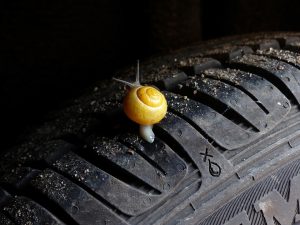 Everyone loves to save a bit of money where they can, but are you doing everything you can to get better gas mileage and reduce spending at the pumps? There are a lot of things you can do to ensure you get the most out of every fill-up.
Everyone loves to save a bit of money where they can, but are you doing everything you can to get better gas mileage and reduce spending at the pumps? There are a lot of things you can do to ensure you get the most out of every fill-up.
Keep Your Tires Properly Inflated
Something as simple as making sure your tires are fully inflated throughout the year can lead to marked improvements in gas mileage throughout the course of a year. As tires lose pressure, more surface touches the road, which in turn, increases friction against the road. This makes the engine work harder to fight this friction as you drive. Properly inflated tires help you roll further at sustained speeds, reducing the need to press the gas as much.
Drive Sensibly
Simply driving in a sensible manner can also save you some gas. Accelerating quickly causes the RPMs to jump by a few thousand. When the engine is operating at these higher RPMs, it’s using significantly more fuel than when cruising between 1,000 to 2,000 RPMs. Of course, you still need to accelerate quickly to merge onto a highway or perform a safe passing maneuver, but driving at high speeds all the time adds up in the fuel economy department.
Use Your AC at High Speeds
There’s something magical about having your windows down on the highway. An amazing rush of wind in your face cooling you down despite heat. However, at some speeds, keeping your windows up and putting the AC on can improve your fuel economy. Once you roll down your windows, the amount of drag your car creates is increased, which means the engine needs to work harder to cut through the air.
Change Your Oil Regularly
Once your oil becomes dirty, it can become less effective, making the engine work harder for every RPM. Staying on top of your oil changes is a great way to keep your fuel economy in good shape. Changing your oil regularly can also reduce costly engine issues down the road.
Get That Check Engine Light Fixed
A check engine light can mean a lot of things. While it may not be dangerous to drive with the check engine light on, it can lead to larger problems if left unchecked. Some engine issues that cause check engine lights will negatively affect your fuel economy in a big way. Faulty valve timing solenoids are some of the biggest offenders in the fuel economy department. Regardless of the issue, get your check engine light diagnosed and corrected as soon as possible.
Avoid Stop-and-go Traffic
Your engine uses the most fuel bringing the car up to speed. If you need to constantly stop the car and bring it back up to speed because of traffic, your fuel economy will be suffering. Another thing to try to avoid is very short trips, such as ones down the road or to the mailbox. These shorter trips can create more engine build-ups, which would be cleaned up by the engine during a longer drive of 5 miles or more.
Employing just a few of these tips will have you saving money at the pumps in no time. You’ll be surprised at how much money you save by doing so.
Image via pixabay.com





